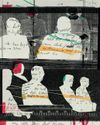
In the tale of an alienated father and daughter, characters stare deeply into themselves.
The Great American Novel is a long-dead cultural aspiration, extinguished by a healthy realization that the country is too big and too varied to generate any singular, definitive volume. American novelists tend, in our time, to earn public recognition of greatness in a steady, incremental (one is almost tempted to say un-American) way: through the long-term production of many books that arrive with a certain regularity and are roughly on the same scale, one to the next. For writers as different as Alice McDermott, Colson Whitehead, and Richard Powers, the greatness classification comes more from accrual than from explosion.
Even so, some younger novelists with exceptional gifts seem to have a romantically persistent notion of the singlebook catapult. Now in his mid-forties, but still boyishly author-photo’d, Garth Risk Hallberg continues to wobble with promise and perplexity. His novels, so far only three in number, sometimes murmur and sometimes roar, operating by wisps of inference or by maximalist elaboration. He has flirted with a kind of cosmic connectedness, or at least a large sociopolitical canvas, before subsiding—as he has done with his new book, “The Second Coming” (Knopf )—back into the super-circumscribed and familial. Looking at the three books together, a reader perceives not so much a multifarious œuvre as a series of make-or-break shots.
This story is from the May 27, 2024 edition of The New Yorker.
Start your 7-day Magzter GOLD free trial to access thousands of curated premium stories, and 9,000+ magazines and newspapers.
Already a subscriber ? Sign In
This story is from the May 27, 2024 edition of The New Yorker.
Start your 7-day Magzter GOLD free trial to access thousands of curated premium stories, and 9,000+ magazines and newspapers.
Already a subscriber? Sign In

GET IT TOGETHER
In the beginning was the mob, and the mob was bad. In Gibbon’s 1776 “Decline and Fall of the Roman Empire,” the Roman mob makes regular appearances, usually at the instigation of a demagogue, loudly demanding to be placated with free food and entertainment (“bread and circuses”), and, though they don’t get to rule, they sometimes get to choose who will.

GAINING CONTROL
The frenemies who fought to bring contraception to this country.

REBELS WITH A CAUSE
In the new FX/Hulu series “Say Nothing,” life as an armed revolutionary during the Troubles has—at least at first—an air of glamour.

AGAINST THE CURRENT
\"Give Me Carmelita Tropicana!,\" at Soho Rep, and \"Gatz,\" at the Public.

METAMORPHOSIS
The director Marielle Heller explores the feral side of child rearing.

THE BIG SPIN
A district attorney's office investigates how its prosecutors picked death-penalty juries.

THIS ELECTION JUST PROVES WHAT I ALREADY BELIEVED
I hate to say I told you so, but here we are. Kamala Harris’s loss will go down in history as a catastrophe that could have easily been avoided if more people had thought whatever I happen to think.

HOLD YOUR TONGUE
Can the world's most populous country protect its languages?

A LONG WAY HOME
Ordinarily, I hate staying at someone's house, but when Hugh and I visited his friend Mary in Maine we had no other choice.

YULE RULES
“Christmas Eve in Miller’s Point.”